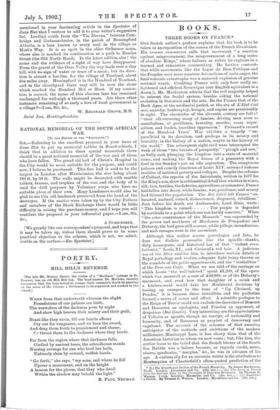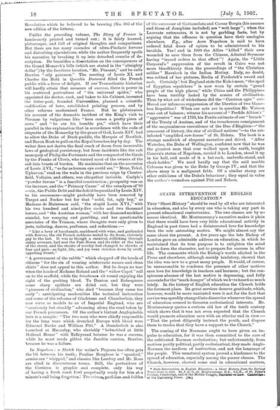BOOKS.
THREE BOOKS ON FRANCE.*
OUR Scotch author's preface explains that his book is to be taken as an exposition of the causes of the French Revolution. His summa summarum calls that movement "a reaction against misgovernment, the misgovernment of a long series of absolute Kings," whose failures as rulers he explains in a learned and exhaustive commentary. He further contends that while movements like the Ligue du Bien Publique and the Frondes were mere amateur detonations of caste anger, the final volcanic catastrophe was a matured explosion of genuine national wrath. Crediting France with only four really en- lightened and efficient Sovereigns (our English equivalent is a dozen !), Mr. Mackinnon admits that the evil majority helped to subvert the feudal system, besides aiding the national evolution in literature and the arts. Be the France that of the Dark Ages, or the mediaeval period, or the era of L'Etat c'est moi, anarchy, bankruptcy, hunger, and rapine are persistently in sight. The chronicles of the eleventh century are full of "their oft-recurring story of famine, driving men even to cannibalism, of pestilence, brutality, murder, crass super- stition, and leaden, heartless oppression." Froissares record of the Hundred Years' War exhibits a tragedy "un- paralleled in its duration, and perhaps in its misery and brutality, in the history of a nation, maybe in the history of the world." The subsequent eight civil wars interrupted the work of those "two breasts of prosperity," "plough and sow," as Sully said, plunging the kingdom into a state of material coma, and making the Royal dream of a peasantry with a fowl in the Sunday's pot an idle aspiration. . The sumptuous palaces and courtly functions of Louis XIV. screened hideous realities of national poverty and collapse. Despite the reforms of Colbert, the reports of the Intendants, written in 1697 for the King's son, show in arithmetical detail that whether in wines, silk, lace, textiles, the fisheries, agriculture, or commerce, France had fallen into decay, while famine, war, pestilence, and misery had thinned the population. The Rdi Soleil left France "ex- hausted, maimed, ruined, disheartened, disgraced, rebellious." Just before his death our Ambassador, Lord Stair, wrote :
"This kingdom is ruined. The people is degraded by servitude to a point which one can hardly conceive." When "the solar countenance of the Monarch" was superseded by the gowns and necklaces of Mesdames de Pompadour and Dubarry, the loaf grew still scarcer, while pillage, incendiarism, and mob ravages were in the ascendant.
Although this author scorns genealogies and lists, he does not disdain personalia like the spindle - shanks, dirty homespuns, and historical hat of that " violent revo- lutionist," Louis XI., and Choiseul's red hair. A judicious use of the filter enables him to introduce certain details of Royal pathology and erotica adequate light being thrown on the scandals of the petits appartements, and the " bestialities " of the Pare aux Cerfs. When we are told of the carriage on which Louis "the well-beloved" spent £1,200, of the opera which was mounted at a cost of £40,000, or of the Dubarry's marmoset, and read bow that daughter of a monk and a kitchen-maid would take her Ministerial . decisions by tossing up oranges to the tune of "Up Choiseul, up Praslin," it is because these trivialities and the guillotine formed a nexus of cause and effect. A scientific prologue to the Reign of Terror could not exclude the doctrines of Boasuet and Descartes as apologists, and Fenelon as opponent, of despotism (Dei Gratid). Very interesting are the appreciations of Voltaire as apostle, though no martyr, of nationality and humanity, and of Rousseau as prophet of democracy and vagabond. The account of the schemes of that amazing anticipator of the methods and ambitions of the modern millionaire, Mississippi Law, is less showy than that of the American historian to whom we now come ;- but, like him, the author leans to the belief that the Scotch blower of the South Sea Bubble was a failure because, as regards credit, notes, shares, syndicates, "margins," Sze, he was in advance of his age. A curious slip for an accurate writer is the attribution to Montesquieu of Chesterfield's often-quoted prediction of the • (1.) The Growth and Decline of the French Monarchy. By James Mackinnon, Ph.D. London: Longmans and CO. [21s. net.]--(2.) The Story of Franco from the Earliest Time to the Consulate of Napoleon Bonaparte. By Thomas E. Watson. 2 vols. London : le.cmillan and Co. (21s. net.]—(l.) Eapoloon: a Sketch. By Thomas E. Watson. London : Macmillan and Co. [lOs. net.]
Revolution which he believed to be brewing (No. 303 of the new edition of the letters).
Unlike the preceding volume, The Story of France is
handsomely printed and turned out ; it is fairly learned, picturesque, and full of original thoughts and comparisons. But there are too many cascades of ultra-Pindaric fervour and disturbing ejaculations, while the author frequently spoils his narrative by breaking it up into detached crumbs of de- scription. He beautifies a dissertation on the consequences of the Grand Monarch's bills (which are stated in the "almighty dollar") by the facetious locution, "Mr. Peasant," and he calls Barrere "oily gammon." The meeting of Louis XI. and
Charles the Bold in Quentin Durward filled the French public with a fever of delight. If our Transatlantic historian
will hardly attain that measure of success, there is power in his scattered portraiture of "the universal spider," who appointed his doctor, cook, and baker to his Cabinet, invented the letter-post, founded Universities, planned a scientific codification of laws, established printing presses, and by other reforms modernised France. But he plebeianises his account of the dramatic incident of the King's visit to Peronne by vulgarisms like "here comes a pretty piece of news" and "he ate his humble pie," which have their parallel in the explanation that in accordance with the code of etiquette of the Monarchy by the grace of God, Louis XIV. had to allow the Duke of Duck-puddle, the Marquis of Bootlick, and Baron Bosh to pull on the Royal breeches day by day. The writer does not derive the final crack of doom from inexorable laws of geological persistency, but from incidents like the salt monopoly of Philip the Fortunate and the conquest of the Gauls
by the Franks of Clovis, who turned most of the owners of the soil into beasts of burden. He maintains that on the accession
of Louis XVL, "so far as human eye could see," " Mene, Tekel, Uphamin," read on the walla in the previous reign by Chester- field, Voltaire, and others, was altogether invisible. Carlyle's "powder throne" is a fanciful construction ; prosperity was on the increase, and the "Primary Cause" of the cataclysm of '89 —viz., the Public Debt and the deficit bequeathed by Louis XIV. to his successors—might probably have been removed by Turgot and Necker but for that "solid, fat, ugly boy," as Madame de Maintenon said, "the stupid Louis XVI.," with his two hundred and ninety-five cooks and two thousand horses, and "the Austrian woman," with her diamond necklace scandal, her romping and gambling, and her questionable associates of the Trianon, whose thoughts were only given to jests, tailoring, dances, perfumes, and seductions :—
"Like a bevy of bacchanals, maddened with wine, and garlanded with flowers, the old French noblesse reeled to its doom, riotously gay to the last. It was as though a carnival, rollicking through sunny avenues, had met the Pale Horse and its rider at the turn of the street, and the shouts of revelry had changed to shrieks of fear and pain—as light, life, and joy were stricken down by swift, appalling Death."
"A government of the rabble" which chopped off the heads of citizens "for the sin of wearing aristocratic names and clean shirts" does not appeal to this author. But he drops no tear when the heads of Madame Roland and the" widow Capet "roll on to the scaffold, while the tricoteuses sit round enjoying the sight of the gushing blood. To Danton and Robespierre some sharp epithets are doled out, but they were "pioneers of civilisation," who died "because they came too early " : anticipating modernities like technical instruction and some of the reforms of Gladstone and Chamberlain, they now serve as models to us of Imperial England, who are "cautiously but steadily" advancing along the road taken by our French precursors. Of the author's blatant Anglophobia
here is a sample : "The two men who were chiefly responsible for the long wars which drenched Europe with blood were Edmund Burke and William Pitt." A thunderbolt is also launched at Macaulay, who slavishly "hobnobbed at little Holland House" with Talleyrand because he was a success, while he must needs gibbet the Jacobin carrion, Barr■me, because he was a failure.
In Napoleon : a Sketch the writer's Pegasus too often gets the bit between his teeth ; Pauline Borghese is "spanked," armies are "whipped," and classics like Lanfrey and Mr. Rose are cited in discourteous terms. Still, the portraiture of the Corsican is graphic and complete, only his way of having a fresh roast fowl perpetually ready for him at a minute's call being forgotten! The crimes, perfidies. and foibles of the successor of Gattamelata and Caesar Borgia (his amours and those of Josephine included) are "writ large" ; when the Laureate extenuates, it is not by garbling facts, but by arguing that the offences in question have their analogies elsewhere. E.g., after Acre Napoleon is said to have ordered fatal doses of opium to be administered to his invalids. Yes ! and in 1900 the Allies " killed " their own wounded to save them from the Chinese, Admiral Seymour having "issued orders to that effect" ! Again, the "Little Corporal's" suppression of the revolt in Cairo was not more bloodthirsty than the proceedings of "the Christian soldier" Havelock in the Indian Mutiny. Italy, no doubt, was robbed of her pictures, Berlin of Frederick's sword and sash. Certainly ! but England stole the Koh-i-noor, "the spoil of Egyptian sepulchres" is now worn by certain "grand people of the high places," while China and the Philippines have been terribly looted by the armies of civilisation. Then by what act of wickedness did the "Corsican ogre" out- Herod our infamous suppression of the liberties of two blame- less Republics ? When our acts are in question Mr. Watson runs out of balance; witness his account of" Perfide Albion's " " aggressive " war of 1793, his Foxite estimate of our " breach " of the Treaty of Amiens, and of the treacherous consignment of the magnanimous executioner of the Duo d'Enghien—" the ornament of history, the star of civilised nations "—to the rat- infested "amplified cow-house" of St. Helena. The book is a strange sandwich of eloquent narrative and drivel. "After Waterloo, the Duke of Wellington, confident now that he was the greatest man that ever walked upon the earth, bought Canova's statue of Napoleon, carried it to London, stood it up in his hall, and made of it a hat-rack, umbrella-stand, and cloak-holder." We need hardly say that the said marble Colossus was given to the Duke by George IV., and that the above story is a malignant fable. Of a similar stamp are other criticisms of the Duke's behaviour ; they equal in value the author's tornadoes against Pitt and Nelson.















































 Previous page
Previous page